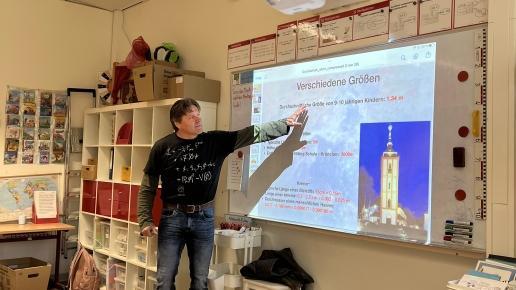Rent a Prof - The university comes into the classroom
Expert lectures in schools, an offer for advanced courses in the upper secondary school.
Simply arrange for a professor from the University of Siegen to visit your classroom free of charge and have the latest research findings and exciting topics explained to you in a clear way:
- What are the thinnest materials in the world?
- What holds the universe together?
- What is the special theory of relativity?
- What is artificial intelligence and machine vision?
A scientist from our university will be happy to answer these and other questions. Current topics in physics, electrical engineering, mathematics and computer science can be found in the list below. You can also see exactly how a lecture at the university actually works. After the lecture, questions about studying will also be answered: How does teaching and learning work at university? What career prospects does a degree course offer me?

- Civil Engineering
Prof. Dr. Christian Schulze:
Why should a truck drive 200 km/h? - Biology
Prof. Dr. Hans Merzendorfer:
Immune system and vaccination protection - Biology, Social Sciences
Prof. Dr. Christoph Strünck
How bad is our healthcare system really? - Biology
Prof. Dr. Florian Centler
Next-generation sequencing: the new microscope for the world's smallest WGs - microbiomes - Biology
Prof. Dr. Hans Merzendorfer
Immune system and vaccination protection - Physics
Prof. Dr. Carsten Busse
The thinnest materials in the world - Physics:
Prof. Dr. Tobias Huber
Special theory of relativity - simply explained
Enquiries now - Physics
Prof. Dr. Ramona Wolf
The physics of chance - Physics
Prof. Dr. Ivor Fleck
Gravitational wave astronomy - Physics
Prof. Dr. Carsten Busse
The physics of the snowflake - Physics
Prof. Dr. Ivor Fleck
Medical Imaging - Physics
Prof. Dr. Otfried Gühne
The current Nobel Prize in Physics clearly explained - Physics
Prof. Dr. Ivor Fleck
Physics of the human body - Physics
Prof. Dr. Alexander Lenz
What holds the universe together? - Physics
Prof. Dr. Otfried Gühne
Secret messages from light - Mathematics
Prof. Dr. Franz-Theo Suttmeier
Segways in school sports? A plea for the dedigitalization of math lessons - Mathematics
Prof. Dr. Franz-Theo Suttmeier
Hidden Figures: The secret (math) knowledge of the Booma - Mathematics
Jun. Prof. Dr. Tommy Hofmann
The one million dollar equation - Mathematics
Prof. Dr. Volker Michel
Why do we actually need mathematics? - Mathematics
Prof. Dr. Volker Michel
Mathematics for Future - a climate model 1.0 - Mathematics
Prof. Dr. Volker Michel
Cause, analysis and prediction - Mathematics
Dr. Thomas Reppel
(Asymptotic) confidence intervals - Bernoulli and chocolate lenses - Mathematics, Social Sciences
PD Dr. Steffen Unkel
Statistics in Medicine and Epidemiology - Mathematics, Social Sciences
PD Dr. Steffen Unkel
Machine learning from a statistician's perspective - Mathematics, Physics
Prof. Dr. Tobias Huber
Introduction to complex numbers - Mechanical Engineering
Prof. Dr. Peter Kraemer
How intelligent can a machine become? A dialog about machine diagnostics and modern mechanical engineering - Computer science
Prof. Dr. Michael Möller
Artificial intelligence and machine vision - Computer Science
Dr. Michael Wahl
How do smartphones work today? - Computer Science
Prof. Dr. Ivo Ihrke
Making invisible things visible: Imaging from atoms to black holes - Computer Science
Prof. Dr. Kristof Van Laerhoven
Wearables in medicine: more than just fitness bracelets - Computer science
Dr. Christian Weber
AI in medicine - Computer Science, Physics
Dr. Kai Hahn
Microchips: Billions of components on a fingernail - Electrical engineering
Prof. Dr. Frank Gronwald
Safe flying and electromagnetic compatibility in the aviation sector - Interdisciplinary
Prof. Dr. Andreas Kolb
Science-Fake-Fake Science-Alternative Facts- What is science anyway? -
Physics in elementary school
Prof. Dr. Alexander Lenz
What is the smallest thing in the universe? (4th grade elementary school)
